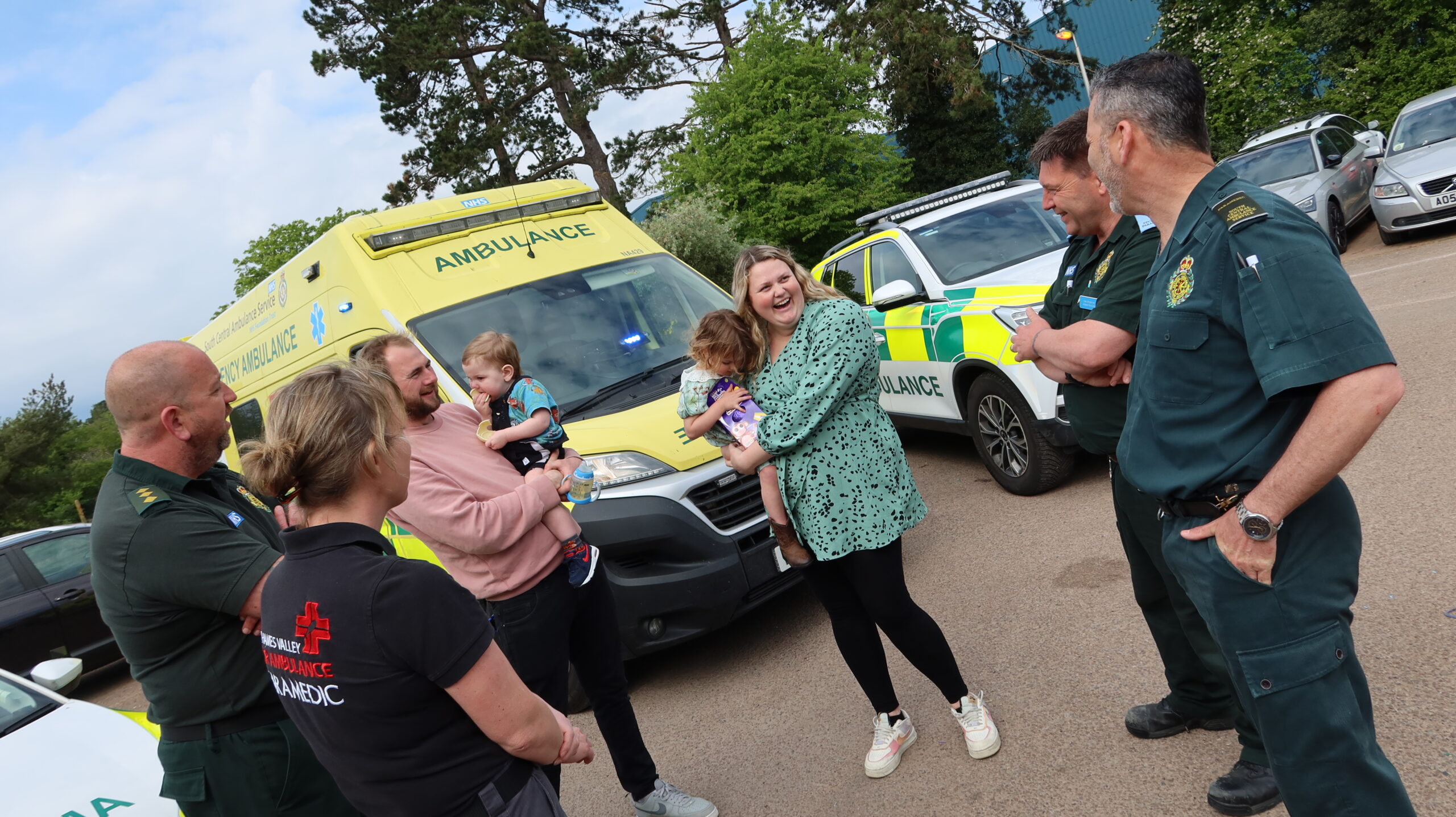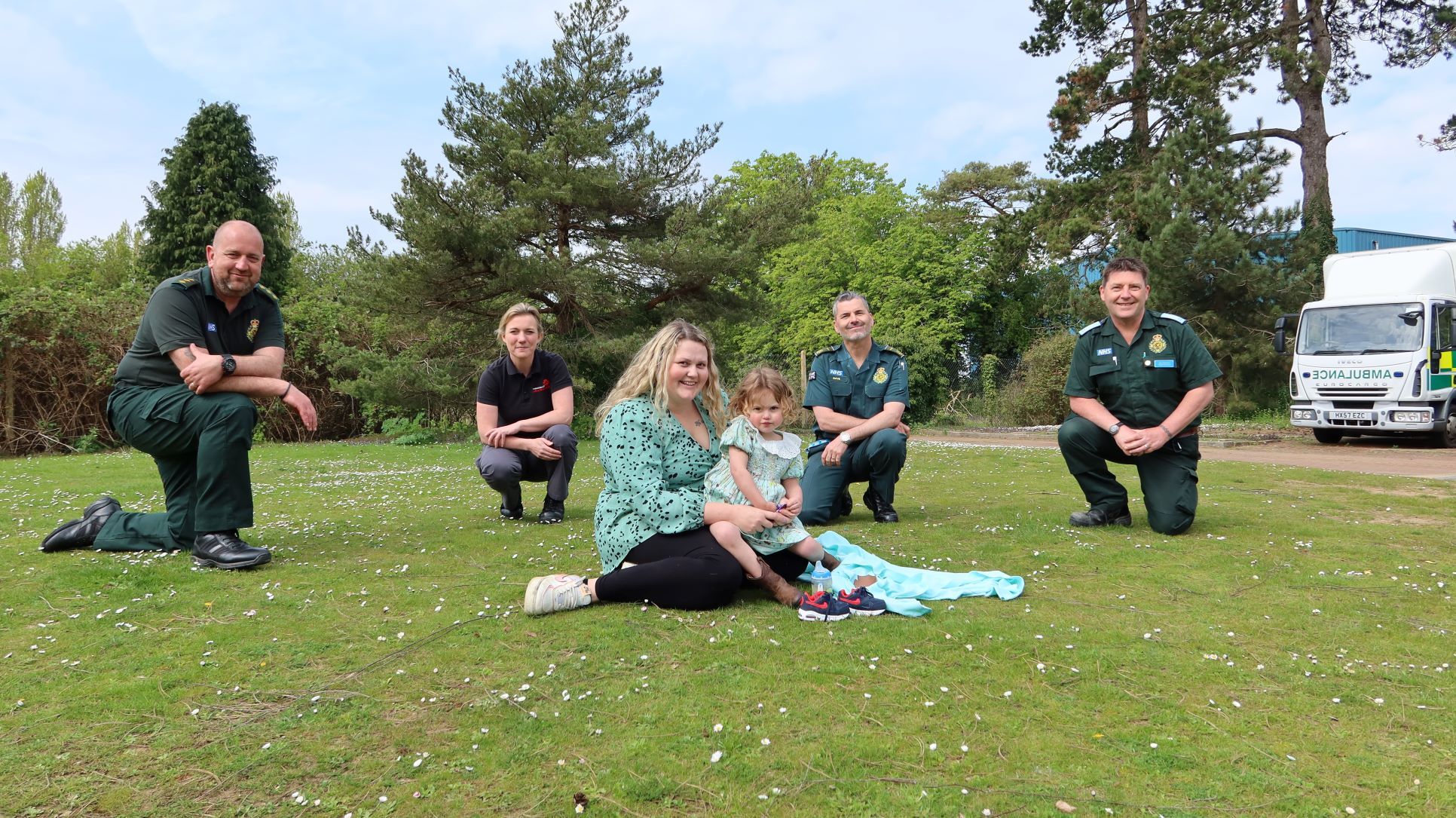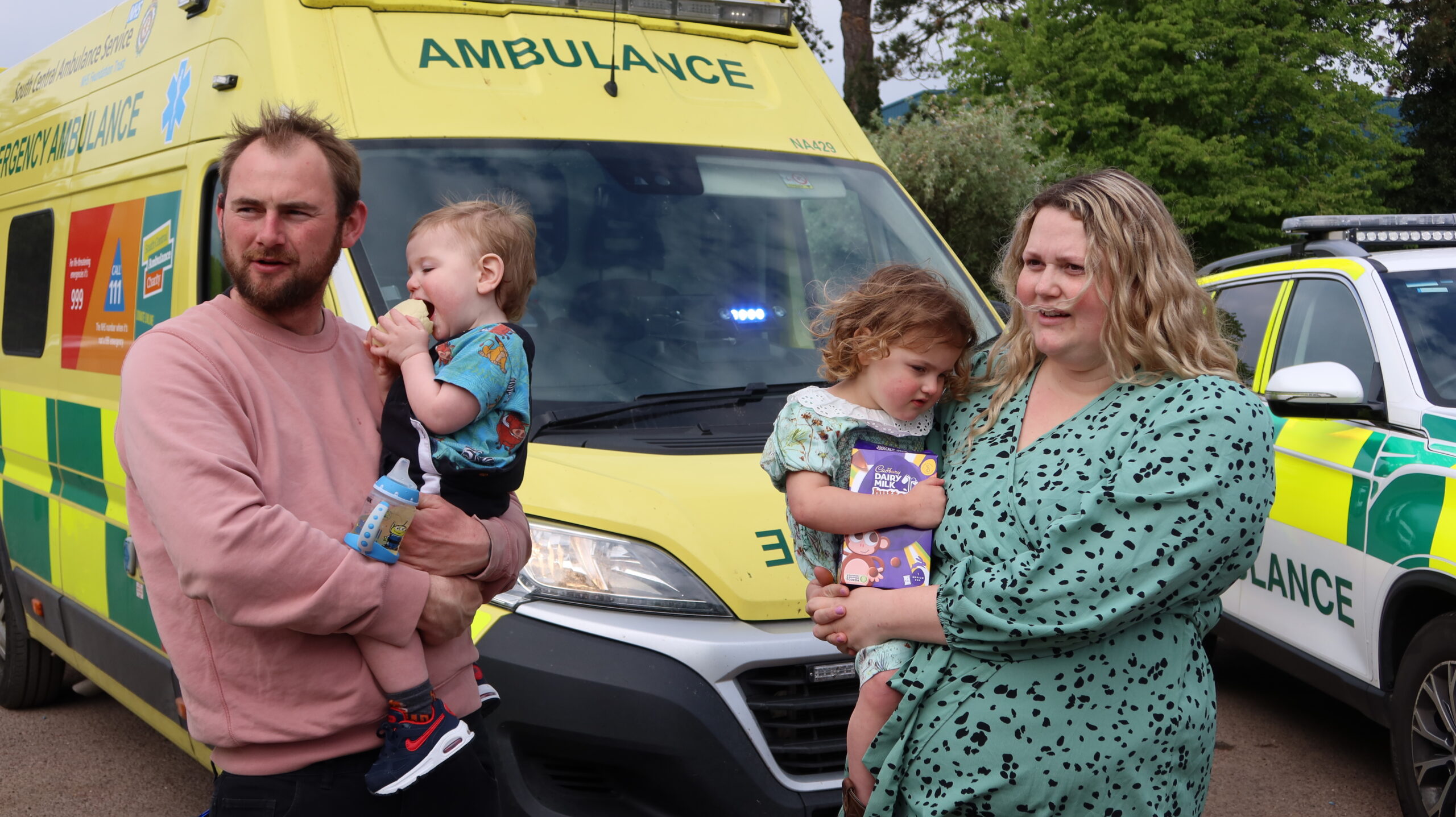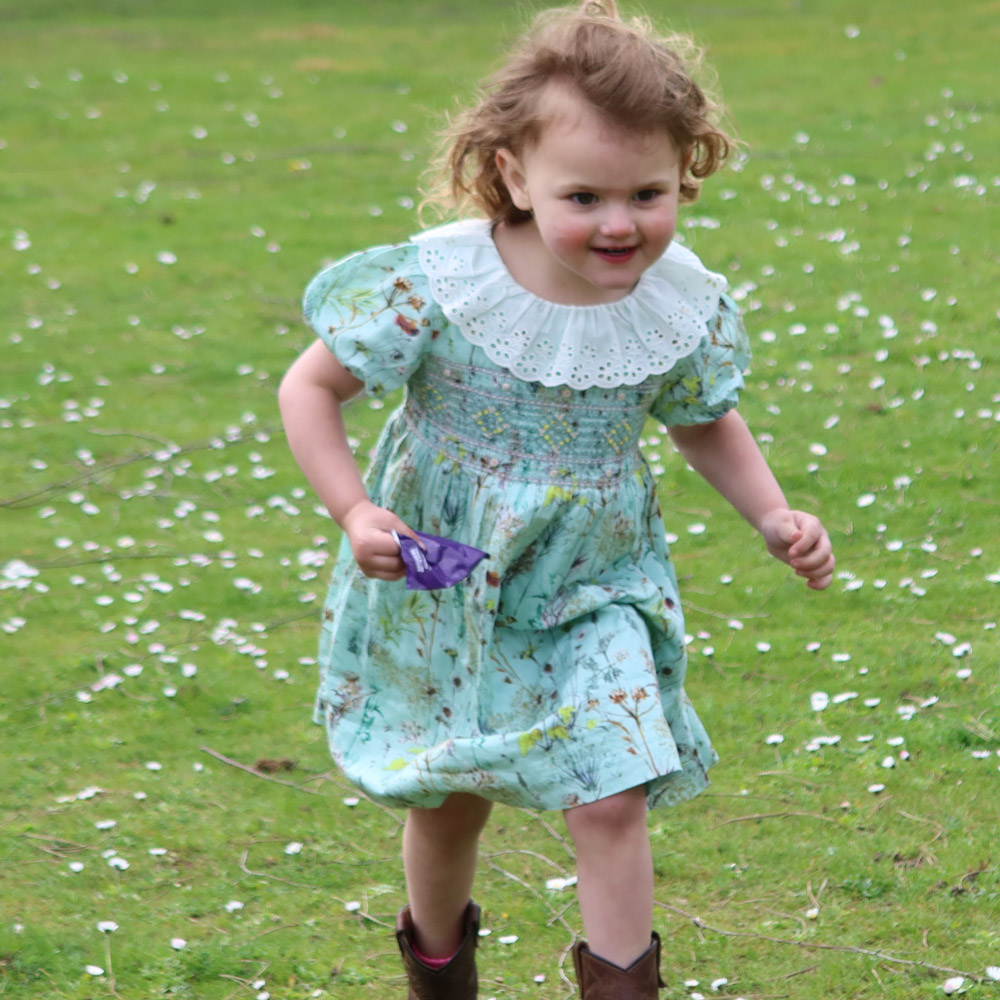Meet Rumi…
On 10 January last year, the family had been enjoying a normal Sunday morning at home in Eynsham.
“Rumi was 20 months old and had been playing happily that morning”, remembers Kelly. “Jac had popped out so when he came to the door, I went to let him. As we both came back into the sitting room, Rumi had – we thought – fallen asleep on the sofa. She was making a strange snoring sound but neither of us thought anything of it at first.”
Jac adds: “I tried to wake her up with my dinosaur impression that usually works but she didn’t respond at all, which was unlike her. Then when I picked her up, she was completely lifeless and floppy. I went full panic mode, understandably so. Kelly told me to go out and find some help as she couldn’t hear what the 999 call taker was telling her to do.”
Emergency Call Taker, Danielle Price-Bradley, answered Kelly’s call in SCAS’ Clinical Co-ordination Centre in Bicester. Kelly had initially thought her daughter might have choked or had something stick in her throat but having laid her on her tummy and given some back thrusts, Rumi had been sick but was still unresponsive. Recognising the seriousness of Rumi’s symptoms, Danielle talked Kelly through how to perform CPR (cardiopulmonary resuscitation) on her daughter as Emergency Despatchers Alicia Workman and Claire Milligan, sent teams from SCAS and TVAA to the family home as quickly as possible.
Within six minutes of the 999 call, the critical care response car from TVAA with Critical Care Paramedic, Emma Gray, and Senior Critical Care Paramedic, Geoff Swann, had arrived at the scene. This was followed a very short time later by ambulance crew, Paramedic Dave McGeachie and Emergency Care Assistant, Lee Andrew, and Paramedic Team Leader, Shaun Elliott, in a rapid response vehicle.
“I was so relieved when everyone came so rapidly”, remembers Kelly.
“Up till then it had felt like I was having an out-of-body-experience. The speed, the equipment, the skills of the team and how they all worked brilliantly together was incredible.”
Emma adds: “In an emergency like this, every minute matters. The fact that we were able to reach Rumi in just six minutes meant we could bring hospital-level care straight to the scene, when she so desperately needed it. Kelly had also done an amazing job in starting CPR. Her quick thinking gave little Rumi a fighting chance.”
“Cases like this stick with you and it was fantastic to be reunited with everyone. It really was a team effort, from the moment the 999 call came into the control room, to how well we worked together at the scene and in the back of the ambulance. Thames Valley Police officers also helped us by taking Kelly and Jac into hospital separately so we could all focus on Rumi – which is what we needed to do.”
“We couldn’t do what we do without the support of the community, so a big thank you to our supporters – your generosity helps us keep families like Rumi’s together.”

After being shocked twice by a defibrillator, the team were able to maintain Rumi’s pulse as they made their way to the John Radcliffe Hospital, in Oxford. During the trip they needed to provide her with advanced airway support as well as use advanced skills to gain intravenous access for vital medication. On arrival in Oxford, she was handed over to the hospital’s specialist teams. Rumi was kept in a medically induced coma for two days but when she woke, Kelly was overjoyed when she yelled ‘Mummy’ as soon as she saw her.
“Rumi had lots of tests to try and work out why she had her cardiac arrest, and 18 days after being admitted to the John Radcliffe she was transferred to University Hospital Southampton where she had an ICD implanted”, says Kelly.
An ICD – implantable cardioverter defibrillator – is a small device that treats people with dangerously abnormal heart rhythms by sending an electric pulse to correct the heart back into normal rhythm. Rumi was also diagnosed with Long QT Syndrome – a very rare, genetic condition.
Jac tells the team, “Rumi calls the device her ‘box’ as you can see the shape of it under her skin and sometimes, she’s a bit confused as to why other children don’t have one too. Apart from having to be careful around magnets – and we’re finding lots of toys unexpectedly have them – and having medication six times a day at the moment, she’s very much a happy, playful toddler.”
“It’s been tough for Jac and I”, admits Kelly. “I remember when Rumi was first discharged from hospital and we felt suddenly very isolated and alone without any machines reassuring us that she was fine. We’re getting there, slowly. I had to get rid of that sofa in the end as it became one of Rumi’s favourite places for her afternoon nap! We’ve recently moved house and that has also helped, as it means Rumi is going to have her own room once we finish decorating.”
Team Leader Shaun Elliott was particularly pleased to see Rumi and her family in much happier circumstances. “I’ve been a paramedic for over 20 years”, he says, “and had never had to shock anyone as young as Rumi before. With the skills and experience of the team looking after Rumi, we all had a vital role to play and when we handed her over at the hospital, we knew we had done everything we could. But we often don’t know about the long term outcome for our most critically ill patients, so seeing her today has been brilliant for all of us.”

After being shocked twice by a defibrillator, the team were able to maintain Rumi’s pulse as they made their way to the John Radcliffe Hospital, in Oxford. During the trip they needed to provide her with advanced airway support as well as use advanced skills to gain intravenous access for vital medication. On arrival in Oxford, she was handed over to the hospital’s specialist teams. Rumi was kept in a medically induced coma for two days but when she woke, Kelly was overjoyed when she yelled ‘Mummy’ as soon as she saw her.
“Rumi had lots of tests to try and work out why she had her cardiac arrest”
“Rumi had lots of tests to try and work out why she had her cardiac arrest, and 18 days after being admitted to the John Radcliffe she was transferred to University Hospital Southampton where she had an ICD implanted”, says Kelly.
An ICD – implantable cardioverter defibrillator – is a small device that treats people with dangerously abnormal heart rhythms by sending an electric pulse to correct the heart back into normal rhythm. Rumi was also diagnosed with Long QT Syndrome – a very rare, genetic condition.
Jac tells the team, “Rumi calls the device her ‘box’ as you can see the shape of it under her skin and sometimes, she’s a bit confused as to why other children don’t have one too. Apart from having to be careful around magnets – and we’re finding lots of toys unexpectedly have them – and having medication six times a day at the moment, she’s very much a happy, playful toddler.”
“It’s been tough for Jac and I”, admits Kelly. “I remember when Rumi was first discharged from hospital and we felt suddenly very isolated and alone without any machines reassuring us that she was fine. We’re getting there, slowly. I had to get rid of that sofa in the end as it became one of Rumi’s favourite places for her afternoon nap! We’ve recently moved house and that has also helped, as it means Rumi is going to have her own room once we finish decorating.”
Team Leader Shaun Elliott was particularly pleased to see Rumi and her family in much happier circumstances. “I’ve been a paramedic for over 20 years”, he says, “and had never had to shock anyone as young as Rumi before. With the skills and experience of the team looking after Rumi, we all had a vital role to play and when we handed her over at the hospital, we knew we had done everything we could. But we often don’t know about the long term outcome for our most critically ill patients, so seeing her today has been brilliant for all of us.”
Before leaving, the family again tell everyone how amazing they were and Rumi and her little brother Jaxon, are delighted with their Easter Egg gifts. On Friday, 22 April, Rumi will celebrate her third birthday – one that she probably wouldn’t have seen without the incredible effort from the SCAS and Thames Valley Air Ambulance team.
Shaun concludes by adding, “If people see just how many resources and how much effort is required to ensure that a patient like Rumi, who is literally minutes away from death, has the best possible chance of survival, then they would realise why SCAS spends so much effort on asking people to only call 999 when it is a very serious or life-threatening emergency.”


